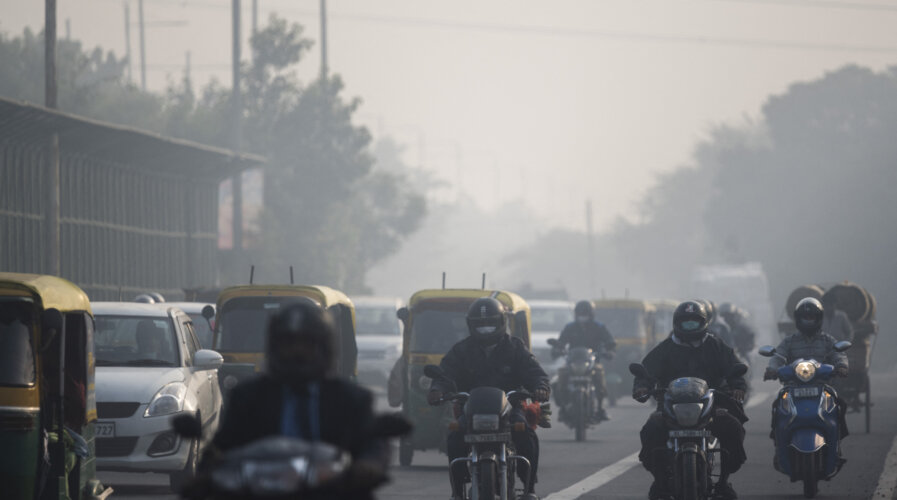
India bans bike taxis in its capital city, a blow to Uber, Ola, Rapido, and companies alike. (Photo by Jewel SAMAD / AFP)
India bans bike taxis in its capital city, a blow to Uber, Ola, Rapido, and companies alike
- App-based operators such as Ola, Uber, and Rapido were asked to stop operating their bike taxis on the road without commercial permits.
- Currently, the transport department does not give commercial licenses to two-wheelers in India due to a lack of regulations and guidelines.
Undoubtedly, India is among the countries with the most congested cities in the world. If one is stuck in a traffic jam in Mumbai, Bengaluru, or Delhi, they are on one of the world’s Top 10 most-choked roads, according to the 2022 TomTom traffic index report. The upside, though, is that in the last few years, Indians have witnessed the emergence of a new intra-city transport space in India — bike taxis.
While bike taxis have existed in India since the 80s, they only took off in recent years due to strict government regulations. It was only after the success of ride-hailing companies that bike taxis began disrupting the local transport system in Indian cities – and locals love the option. Unfortunately, in a turn of events, Delhi has just announced that using private two-wheelers for hire violates Indian law.
A public order of the Delhi Transport Department noted that bike taxis in Delhi, India’s capital city, violated the Motor Vehicle Act 1988, as the Act prohibits using two-wheelers for commercial purposes. Therefore, the Delhi Transport department decided to ban operators such as Rapido, Uber, and Ola from operating bike taxis in the country’s national capital. Companies violating the order will be penalized with a fine of Rs 1 lakh.
The order, however, does not impact other states. States including Goa, Andhra Pradesh, Haryana, Gujarat, Telangana, West Bengal, Punjab, Rajasthan, Bihar, and Madhya Pradesh continue to allow bike taxis. It isn’t the first time bike taxis have gotten into trouble over their legal status in India.
In January, the Maharashtra state government refused to grant licenses to Rapido’s motorbike taxis – India’s first and largest bike taxi app – saying there were no legal guidelines on their licensing, safety, and fare structure. The Mumbai high court also asked the company to shut down operations because it had no valid license. Rapido went to the extent of approaching the Supreme Court, which directed it back to the high court.
Frankly, the news of the ban has left many locals unhappy, with some believing Delhi’s move lacks logic. “Bike taxis are cheap, resulting in much less traffic than autos/cars. [Bike taxis] are a superb last mile for metros/buses,” political editor Shoaib Daniyal said in a tweet. The move by the Delhi government would also mean that hundreds of people who earn from ferrying passengers on their bikes would lose their source of income.
Bike taxis – a double edged sword in India?
The bike taxi industry in India remains a problem-ridden one, with issues ranging from lack of clarity in bike taxi laws to refusal of permission to operate by transport departments. In this bleak scenario, however, bike taxis have also relieved daily commuters by offering cost-effective and convenient rides.
Especially in the last couple of years, demand has risen among urban commuters for a mode of transportation that can maneuver traffic snarls and poor road infrastructure. After all, in India, locals only have a few efficient and economical options for last-mile connectivity. The wide gap is where the bike taxis fit.
Several states and Union Territories have permitted bike taxis in India. Goa was the first in 1981, and Mizoram in 2016 with the condition that the bike must be under two years old, the driver wears a yellow helmet, and the bike has a yellow number plate. Later some other cities joined, like Andhra Pradesh, Haryana, Gujarat, Telangana, West Bengal, Punjab, Rajasthan, Bihar, Madhya Pradesh, and a few others.
Yet, despite wider acceptance, there have been pockets of resistance at places from vested interests, like, in this case, Delhi. Even Rapido’s co-founder, Aravind Sanka, has said that “The bike taxi service is an outcome of a market necessity, and it will see more adoption in the future to make transport easier. With its growing traffic congestion and a gap for an efficient solution, India definitely needs a vibrant bike taxi industry to provide affordable and reliable transport service to millions of commuters.”
The need for bike taxis can’t be denied, owing to their numerous advantages and the gap in the market. According to a report published by Allied Market Research last year, India’s motorbike taxi market was valued at US$50.5 million and is expected to reach around US$1.5 billion by 2030. With proper planning and implementation, the segment can boost the local economy while saving commuters time, reducing pressure on public transport, and adding to overall economic growth.
READ MORE
- Data Strategies That Dictate Legacy Overhaul Methods for Established Banks
- Securing Data: A Guide to Navigating Australian Privacy Regulations
- Ethical Threads: Transforming Fashion with Trust and Transparency
- Top 5 Drivers Shaping IT Budgets This Financial Year
- Beyond Connectivity: How Wireless Site Surveys Enhance Tomorrow’s Business Network


